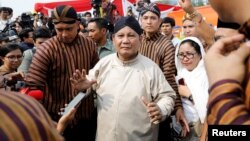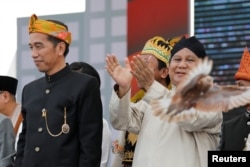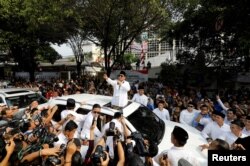Indonesian presidential candidate Prabowo Subianto seems to be following the playbook of U.S. President Donald Trump as he mounts his second campaign for the top office.
Blaming the media has become a theme of the Western-educated, former military commander's second presidential campaign, after he lost in 2014 to President Joko Widodo, who is widely known by his nickname Jokowi. Populism — reflected in his economic plans, recent statements and political track record — seems to be the language of his campaign for the April election.
After demonstrators took to the streets peacefully this month to mark the anniversary of their rally against former Jakarta governor Basuki Tjahaja Purnama, who was later jailed on blasphemy charges, Prabowo criticized the Indonesian media for failing to adequately report on the Islamic rally.
"We [the participants of the rally] are deemed penniless [by the media]," he said in a speech. "Almost all of them didn't report on the millions who gathered." However, Dedi Prasetyo, the National Police spokesman, said only 40,000 people were gathered.
In a written statement, Ahmad Muzani, the secretary general of Prabowo's Gerindra party, clarified that the candidate's statement was an indictment of media owners for misrepresenting his statements. "[Mr.] Prabowo did not fault the journalists and reporters on the ground, but he criticized media owners and media leadership who seemed to have deliberately decided not to publicize the gathering," he said.
"Our presidential campaign has performed as expected, and continues to be under control. Despite experiencing some technical difficulties, our campaign has seen convincing progress. See, we don't have the network privilege the incumbent has, but what's interesting is that we've seen and felt extraordinary support from people at the grassroots," said Irawan Ronodipuro, Director of Foreign Affairs on the National Committee to Elect Prabowo.
The Jokowi campaign would not comment for this story.
Comparisons to Trump
It is still unclear whether the Prabowo campaign will fare better than last time. But his politicking has featured slogans that seem similar to ones used by Trump in his successful 2016 campaign. In October, for instance, Prabowo said, "Why doesn't Indonesia dare to say to Indonesia, 'Indonesia first. Make Indonesia great again?'" recalling Trump's catchphrase.
"The similarity between Trump and Prabowo is that they use the technique that's employed by, say, [political strategist] Roger Stone: Dominate; you can lie, you can be populist as long as the people respond," Andreas Harsono, researcher at the Human Rights Watch, told VOA. "You can also rail against reporters. The irony is that reporters [in Indonesia] get a kick out of being bullied."
Some examples of Prabowo's recent statements, too, are in keeping with the assessment often lobbed at him throughout the 2014 campaign: that his presidency will have parallels with Indonesia's 32-year authoritarian regime, the New Order, spearheaded by Prabowo's late father in-law, Suharto.
Last month, Prabowo called for economic self-sufficiency, saying Indonesia should swear off imports when it can. Some of his economic plans have also been unveiled: reducing corporate and personal income taxes, strengthening small- and medium-sized enterprises, enhancing infrastructures in villages — ambitious aims for a country whose growth is considered sluggish at just 5 percent, lower than Jokowi's 7 percent promise.
Does this populism work in Indonesia, a country with 34 provinces of varying economic statuses? "It is very effective," Harsono said.
Asked whether the populism rings true for the campaign, Ronodipuro toldV OA: "People have the right to be opinionated. What we can assure is that Prabowo-Sandi will bring justice and prosperity to the Indonesian people. Indonesia is a rich and resourceful nation."
Human rights issues
The son of Indonesia's renowned economist, Sumitro Djojohadikusumo, Prabowo's career started in the military during the Suharto regime, commanding notable operations in his role as the brigadier general of the military's special forces, the Kopassus. One of these missions was a rescue of European hostages in 1996.
As the documents in the recently-declassified files from the U.S. Embassy in Jakarta show, his eventual firing was preceded by accusations of the kidnapping of political activists during riots in 1998, some of whom never returned.
"During Suharto's final year in office, at least 20 such activists disappeared. The armed forces in August acknowledged responsibility for illegally kidnaping nine activists who already had been released, several of whom said that they were tortured while in detention. At least 12 activists remained missing as of year's end," wrote the U.S. State Department in a 1999 report.
Though human rights were a major issue in the last election, activists say they won't be as resonant this year because of what they say is Jokowi's inability to resolve past human rights violations, like the Indonesian 1965 massacre or the arrests and murders of West Papuans.
"Jokowi's all but lost the legitimacy to [criticize Prabowo for human rights issues]," Usman Hamid, director of Amnesty International in Indonesia, told VOA. "There's no insurance that if he gets elected, human rights issues will be solved. To solve issues like in Aceh and Papua still relies on repression as opposed to diplomacy."
Poll results
Polls have shown that Jokowi has an edge over Prabowo. Lingkaran Survei Indonesia, one of the country's pollsters, put the Jokowi-Ma'ruf ticket at 53.2 percent, and the Prabowo-Sandiaga ticket at 31.2 percent earlier this month.
But Ronodipuro questioned the credibility of Indonesian pollsters. "The Indonesian people should make an informed decision based on the vision, missions and programs each ticket offers. The way we see it, this election is about a referendum on the economy that will determine the fate of Indonesians in the future," he said.













